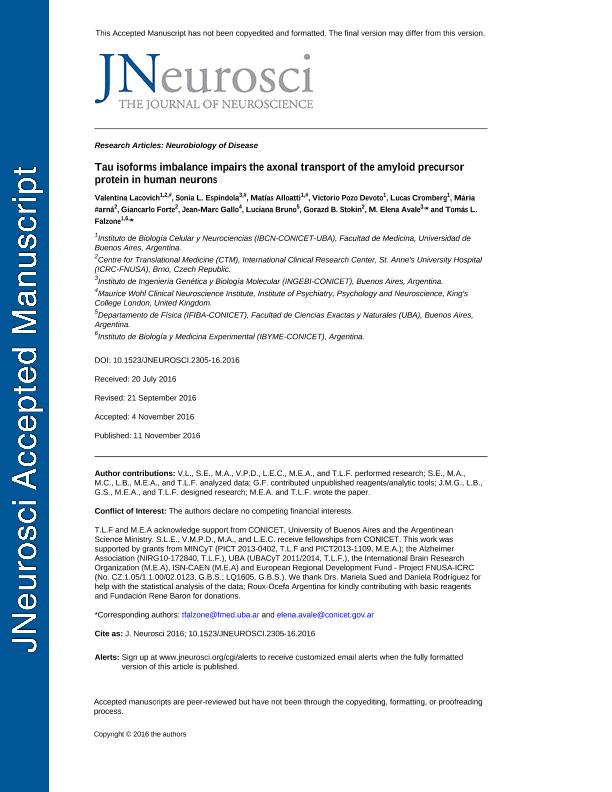Artículo
Tau isoforms imbalance impairs the axonal transport of the amyloid precursor protein in human neurons
Lacovich, Valentina; Espindola, Sonia Lorena ; Alloatti, Matías
; Alloatti, Matías ; Pozo Devoto, Victorio Martin
; Pozo Devoto, Victorio Martin ; Cromberg, Lucas Eneas
; Cromberg, Lucas Eneas ; Carna, Mária E.; Forte, Giancarlo; Gallo, Jean Marc; Bruno, Luciana
; Carna, Mária E.; Forte, Giancarlo; Gallo, Jean Marc; Bruno, Luciana ; Stokin, Xgorazd B.; Avale, Maria Elena
; Stokin, Xgorazd B.; Avale, Maria Elena ; Falzone, Tomas Luis
; Falzone, Tomas Luis
 ; Alloatti, Matías
; Alloatti, Matías ; Pozo Devoto, Victorio Martin
; Pozo Devoto, Victorio Martin ; Cromberg, Lucas Eneas
; Cromberg, Lucas Eneas ; Carna, Mária E.; Forte, Giancarlo; Gallo, Jean Marc; Bruno, Luciana
; Carna, Mária E.; Forte, Giancarlo; Gallo, Jean Marc; Bruno, Luciana ; Stokin, Xgorazd B.; Avale, Maria Elena
; Stokin, Xgorazd B.; Avale, Maria Elena ; Falzone, Tomas Luis
; Falzone, Tomas Luis
Fecha de publicación:
11/2016
Editorial:
Society for Neuroscience
Revista:
Journal of Neuroscience
ISSN:
0270-6474
Idioma:
Inglés
Tipo de recurso:
Artículo publicado
Clasificación temática:
Resumen
Tau, as a microtubule (MT)-associated protein, participates in key neuronal functions such as the regulation of MT dynamics, axonal transport, and neurite outgrowth. Alternative splicing of exon 10 in the tau primary transcript gives rise to protein isoforms with three (3R) or four (4R) MT binding repeats. Although tau isoforms are balanced in the normal adult human brain, imbalances in 3R:4R ratio have been tightly associated with the pathogenesis of several neurodegenerative disorders, yet the underlying molecular mechanisms remain elusive. Several studies exploiting tau overexpression and/or mutations suggested that perturbations in tau metabolism impair axonal transport. Nevertheless, no physiological model has yet demonstrated the consequences of altering the endogenous relative content of tau isoforms over axonal transport regulation. Here, we addressed this issue using a trans-splicing strategy that allows modulating tau exon 10 inclusion/exclusion in differentiated human-derived neurons. Upon changes in 3R:4R tau relative content, neurons showed no morphological changes, but live imaging studies revealed that the dynamics of the amyloid precursor protein (APP) were significantly impaired. Single trajectory analyses of the moving vesicles showed that predominance of 3R tau favored the anterograde movement of APP vesicles, increasing anterograde run lengths and reducing retrograde runs and segmental velocities. Conversely, the imbalance toward the 4R isoform promoted a retrograde bias by a significant reduction of anterograde velocities. These findings suggest that changes in 3R:4R tau ratio has an impact on the regulation of axonal transport and specifically inAPPdynamics, which might link tau isoform imbalances with APP abnormal metabolism in neurodegenerative processes.
Palabras clave:
Alzheimer&Rsquo;S
,
App
,
Axonal Transport
,
Splicing
,
Tau
,
Tauopathies
Archivos asociados
Licencia
Identificadores
Colecciones
Articulos(IFIBA)
Articulos de INST.DE FISICA DE BUENOS AIRES
Articulos de INST.DE FISICA DE BUENOS AIRES
Articulos(INGEBI)
Articulos de INST.DE INVEST.EN ING.GENETICA Y BIOL.MOLECULAR "DR. HECTOR N TORRES"
Articulos de INST.DE INVEST.EN ING.GENETICA Y BIOL.MOLECULAR "DR. HECTOR N TORRES"
Citación
Lacovich, Valentina; Espindola, Sonia Lorena; Alloatti, Matías; Pozo Devoto, Victorio Martin; Cromberg, Lucas Eneas; et al.; Tau isoforms imbalance impairs the axonal transport of the amyloid precursor protein in human neurons; Society for Neuroscience; Journal of Neuroscience; 37; 1; 11-2016; 58-69
Compartir
Altmétricas



